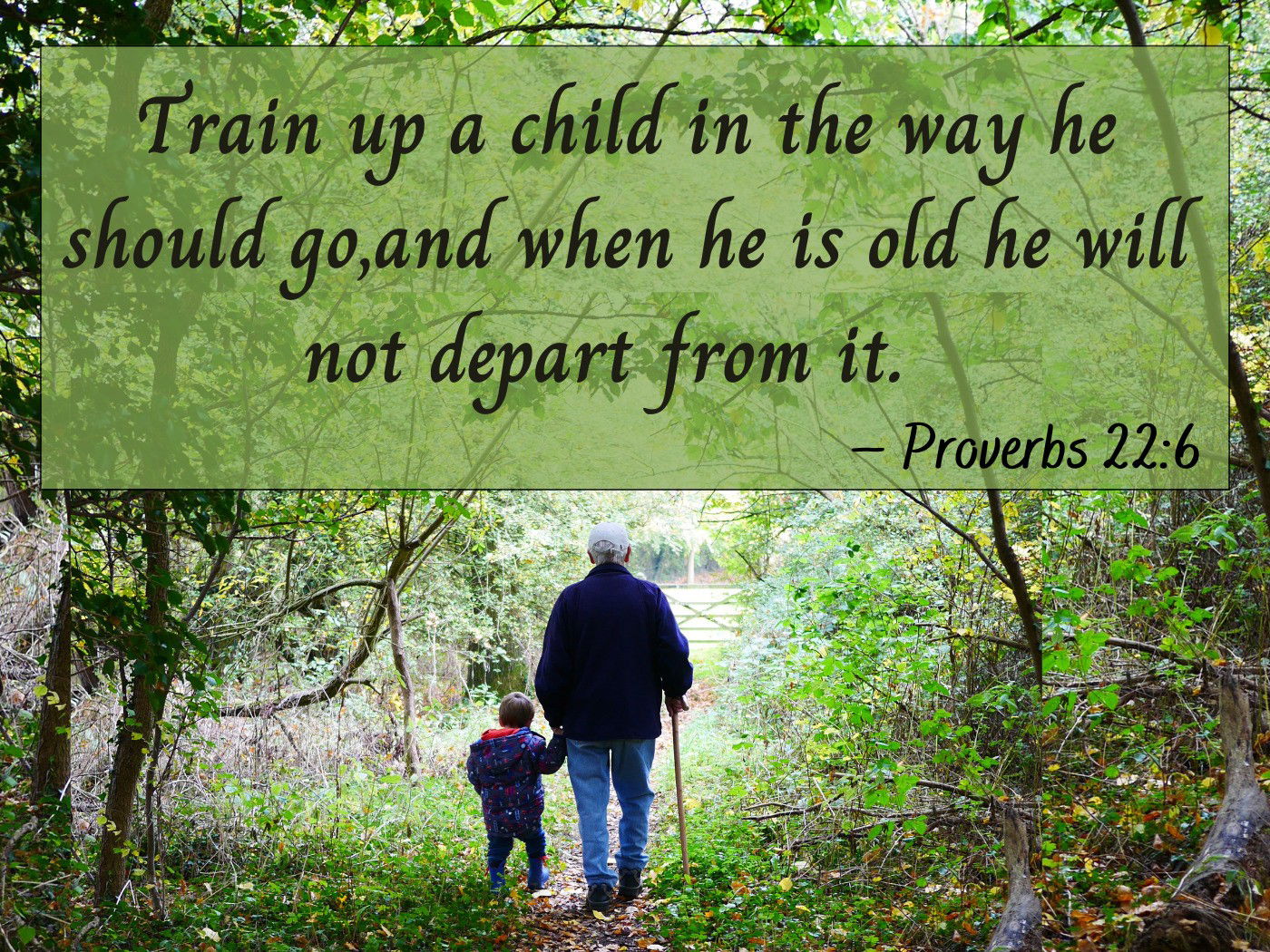Learn through these important steps to put into practice the biblical principle of Proverbs 22:6. Teach your children to follow God's way for a full and happy life.
Train up a child in the way he should go, and when he is old he will not depart from it.
– Proverbs 22:6

Proverbs 22:6 is not a divine promise but a general and practical rule that accompanies the educational process of children. When teaching according to certain principles, the tendency is for individuals to develop those principles. Of course, there are exceptions to the rule, and each individual will eventually decide their own path.
Generally, we can interpret this verse in two ways:
-
As a motivational recommendation, suggesting that it is necessary to properly educate children from an early age (in the way they should go) so that they grow in the right direction.
-
As a warning to parents that if they allow their children to grow up with poor guidance or without references, they will remain that way. That is, if we let children grow up doing whatever they want, they will become selfish and unruly adults.
Both interpretations are important to help parents in teaching their children, aiming for a non-permissive education centered on values and good habits. Above all, it is essential to love the little ones, teaching them to control rebellion and disobedience, while always encouraging good principles, natural talents, and rewarding good behavior.
1. Spend Quality Time Together
Love the Lord your God with all your heart and with all your soul and with all your strength. These commandments that I give you today are to be on your hearts. Impress them on your children. Talk about them when you sit at home and when you walk along the road, when you lie down and when you get up.
- Deuteronomy 6:5-7
Notice that the foundational text says: "teach on the way." This implies the presence of the one who teaches, walking together with the child. Moses instructed the people to teach their little ones "when sitting at home, walking along the road, when lying down and getting up."
Today, it has become increasingly common to delegate the education of children to third parties (nannies, daycares, schools, etc.). We all know how complex it can be, in some cases, to balance parental involvement with all the other daily demands and activities. Parents, as providers, are often compelled to work longer hours to support the family. And sometimes, when they get home, they are already tired and stressed from the day, and they withdraw from the duty and privilege of educating their own children.
In Practice:
- Participate in your child's life and don't be absent.
- Even if only for a few hours a day, be the best parent possible. Value the time spent together.
- Truly take an interest in your children. They can sense when they are being rejected.
- Don’t try to make up for your absence with gifts. What little ones need most is your presence and love.
- Create unforgettable memories with your children through shared experiences. Have fun together, play, talk, share meals, go for walks, play sports, etc.
- Serve God together as a family.

2. Be a Good Example to Follow
Follow my example, as I follow the example of Christ.
- 1 Corinthians 11:1
To imitate means to reproduce what others do. Small children do this all the time. Paul told the Corinthians to imitate him because he was imitating Christ. Truly, we need to be imitators of Jesus.
But, what we see others doing is much more easily absorbed than what we simply hear. Practical examples are far more educational than mere verbal instructions.
Reflect honestly on whether you have been a good example and influence for your children. Be a model in Christian living, in your interactions, and in moral and ethical conduct.
In Practice:
Your children will learn much more from what they see their parents or adults doing than from what they hear being said. Strive to act in ways that demonstrate important values: love, faith, honesty, responsibility, truth, empathy, self-control, resilience, hope, etc.
3. Kindness: Teach Good Manners, Polite Behavior, and Respect
Follow God’s example, therefore, as dearly loved children 2 and walk in the way of love, just as Christ loved us...
- Ephesians 5:1-2a
When we imitate God, we reflect the love that Jesus taught us. This means being genuinely kind, respectful, and honest. These values of being gentle, friendly, and courteous to others are qualities that should be taught at home.
A lack of kindness in relationships should be promptly corrected. Demonstrate this through your own examples as well.
In Practice:
- Start with the basics; teach the "magic words": "Good morning!", "Good afternoon!", "Good evening!", "Sorry/forgive me", "Excuse me", "Thank you!", "Please", etc.
- Thank your child when they do something you asked.
- Apologize when you’ve done something wrong.
- Say "excuse me" when you need to pass by, etc.
- Teach your child to think about others’ well-being and to act with kindness whenever possible.
4. Teach by Saying NO
My son, do not despise the Lord’s discipline,
and do not resent his rebuke,
because the Lord disciplines those he loves,
as a father the son he delights in.
- Proverbs 3:11-12
Correcting children is essential. Moreover, it is a way of showing love. Unfortunately, from an early age, we have selfish and harmful desires. This is why correction is necessary. If every human desire were fulfilled, the world would undoubtedly collapse and become even more chaotic and destructive.
Parents, learn to say NO to your children! We are born into a time where consumerism, selfishness, and individualism have become the norm. We struggle to accept NO as a response to our desires. But Christians must reject this pattern by living in God's way.
Teach your child that NO will always be a possibility in life. The best place to learn this is within the family, surrounded by love. Parents who say YES to everything are causing irreversible harm to their children. These children will grow up believing in easy solutions and will later struggle with life's realities.
In Practice:
Saying NO to your child is good preparation for life, as they won't always receive favorable answers for everything they want. Be wise and intentional; your child needs to learn to grow:
|

5. Setting Boundaries - Teach Your Child to Act with Balance
Whoever spares the rod hates their children,
but the one who loves their children is careful to discipline them.
- Proverbs 13:24
Boundaries need to be taught. Remember, even though they are cute and small, children are born with a sinful nature. Therefore, they need to be loved, taught, and corrected. We live in a society where extremes and eccentricities are often normalized and accepted. However, tolerating certain behaviors can ultimately harm, rather than benefit, your little one.
We don’t want our children to be rejected or merely tolerated because they don’t know how to respect others or behave properly in different settings. Children who grow up without boundaries often become unpleasant and selfish adults.
Some difficult adults ("unbearable" ones) likely had a very permissive and undisciplined upbringing. In trying to do the right thing, parents make a grave mistake when they don't teach boundaries to their children.
In Practice:
- Establish a list of agreed-upon behaviors and tasks (it’s important to highlight behaviors and tasks that need to be followed).
- Teach respect for authority and established rules (Ephesians 6:2-3, Romans 13:1).
- Show the reality of choices and their respective consequences.
- Correct and lovingly address extreme attitudes of aggression, rebellion, selfishness, and disobedience.
- Maintain a balanced and peaceful living environment (Jude 1:2, Romans 15:33). Do not correct your child in anger or frustration from other issues. Wait, talk with your child, and explain why discipline is necessary.
6. Keep Your Promises - Be and Teach Reliability
All you need to say is simply ‘Yes’ or ‘No’; anything beyond this comes from the evil one.
- Matthew 5:37
It’s disheartening to deal with people who lie or fail to keep their word, isn’t it? Just as we want our children to be honest and truthful, we must also act the same way.
In Practice:
- Don’t make promises you can’t keep (Ecclesiastes 5:4).
- It’s better to surprise your little ones than to make promises you can’t fulfill.
- If you promised something and couldn’t keep it, apologize to your child for failing to fulfill the promise and for creating false expectations. Make an effort to ensure it doesn’t happen again.
- Show your child that you are trustworthy and someone they can believe in.
7. Speak the Truth - Teach the Value of Honesty
Therefore each of you must put off falsehood and speak truthfully to your neighbor, for we are all members of one body.
- Ephesians 4:25
Jesus told us that He is the Truth (John 14:6). Therefore, we follow the person of Christ, and if we lie, we displease our Lord. Following the same logic as the previous point: be truthful! Children learn a lot from our actions and how we interact with others. Raise your child in a healthy environment surrounded by values like truth and sincerity.
In Practice:
- God should be our standard of Truth. Children know when we lie to them, and they also notice when there are lies between parents or when we try to portray something that isn’t true.
- Don’t lie to your spouse, children, parents, siblings, boss, etc. (John 8:44).
- Be transparent and don’t tell "half-truths" to your child.
- Don’t speak ill of anyone or make derogatory comments about something in front of the children (Proverbs 16:28, Ephesians 4:29). They will learn from this!
- Don’t give false information over the phone or on social media.
- Be truthful and kind. Don’t overpraise something that isn’t good; that’s pretense. Instead, say you appreciate the effort and encourage continued improvement.

8. Teach Diligence
A sluggard’s appetite is never filled,
but the desires of the diligent are fully satisfied.
- Proverbs 13:4
Diligence is the zeal or dedication in performing a task. Be committed to your daily activities and instill this principle in your child.
Care and readiness in what we do are precious values and make us more attentive and focused in other areas of life. We should strive to do everything as if it were for God (Colossians 3:23). This also helps us correct bad habits like carelessness and laziness.
In Practice:
- Establish a healthy routine of tasks (Ecclesiastes 9:10).
- Balance tasks that require more intellectual or physical effort with moments of leisure and relaxation.
- Discover the areas where your children excel and enjoy being involved.
- Encourage them to develop their natural gifts and talents with dedication and enthusiasm.
9. Walk Wisely with God
Blessed are all who fear the Lord,
who walk in obedience to him.
- Psalm 128:1
All the principles mentioned so far are very important for the emotional, intellectual, moral, and ethical development of your children. But above all, the most important is teaching your child to walk with God.
This is the best teaching you can ever pass on: to love God and follow Him faithfully. If they grow in this Path (John 14:6), you can be sure that no matter what happens in life, they will be better off in the presence of Jesus Christ.
Live in daily communion with the Lord. Be someone your child should look up to. If you want your child to be a child of God and walk in the Lord’s Ways, teach them how it should be. But first, have the attitudes you want them to have.
Be a disciple of Jesus Christ, learning and wanting to follow the Master’s steps. This way, you can walk alongside and wisely disciple your child to follow the same steps.
In Practice:
A) Pray and Teach to Pray (Matthew 21:22):
|
B) Read the Bible Daily (Psalm 1:1-2):
|

10. Love - Teach the Child to Love
And so we know and rely on the love God has for us.
God is love. Whoever lives in love lives in God, and God in them.
- 1 John 4:16
All biblical commandments are summarized in love (Mark 12:29-31). Love is not an order directed only at adults but to everyone, regardless of age. Therefore, it is essential to teach this value to young children.
Practically speaking, love means putting oneself in another’s place, acting for the benefit of others. It involves being kind and polite, forgiving, correcting selfish attitudes, developing affections and friendly relationships, and more.
In Practice:
- Demonstrate love (2 Thessalonians 3:5)! We learn to love when we are loved, so love your child and show how to love God and others.
- Establish a routine of worship and adoration to God. Remember: God first (Matthew 6:33)!
- Involve your children in social support and mission activities; visit orphans, the elderly, the sick, and the homeless; donate food, clothes, and toys to those in need; support missionary work by "adopting" a missionary family — pray, write letters, visit, give, etc.
- Teach empathy and helping those in need (Hebrews 13:1-3).
11. Faith - Teach the Child to Know God
And without faith it is impossible to please God, because anyone who comes to him must believe that he exists and that he rewards those who earnestly seek him.
- Hebrews 11:6
Faith comes through knowledge of God (Romans 10:17). Encourage children to form a correct understanding of who Jesus is and what He has done for us through the Bible. Explain difficult concepts like sin (acting wrongly, contrary to God’s will), repentance (a change in attitude), and salvation (being saved from something very bad) clearly.
"Now faith is confidence in what we hope for and assurance about what we do not see." — Hebrews 11:1
God is worthy of our trust. We need to be convinced that He is good and faithful. Share biblical stories that always highlight God's love, His truth, and His plan for His children. Teach them to pray and read the Bible daily.
In Practice:
- Learn to have faith by observing acts of faith within the family and church (2 Corinthians 5:7).
- Always use encouraging words (Hebrews 3:13). Recite psalms and Bible verses.
- In times of crisis, teach the child to seek God with all their heart.
- Family worship, gospel songs, and memorization of Bible verses are important for building good references.
12. Hope - Teach Persistence and Patience
May the God of hope fill you with all joy and peace as you trust in him, so that you may overflow with hope by the power of the Holy Spirit.
- Romans 15:13
Hope is the confidence and expectation that something better will happen. This is related to faith and waiting. Knowing how to wait is also a quality that should be taught. Control the children’s stubbornness and anxiety. We increasingly desire things faster, and children also pick up on our accelerated tension. Show that it is possible to overcome frustration and be more persistent, achieving goals with some effort.
In Practice:
- Demonstrate and talk about the reasons for having hope and trusting in God and His Word.
- Share biblical stories or personal testimonies that narrate how God provided a way out and hope during difficult times.
- Moments of suffering, loss, or frustration always occur in life. During these times, trust in God and be a role model for your child. Thus, your child will learn to place their future and expectations in the hands of Jesus Christ.
You Might Also Be Interested In:
